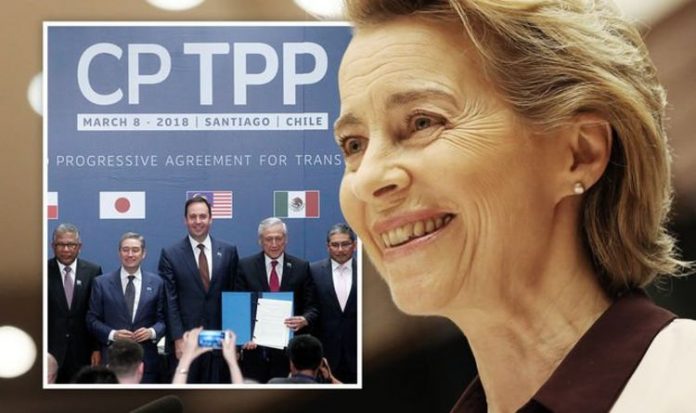For the last 48 years, EU membership constricted Britain’s ability to make its own decisions and set policies. However, on January 1, the country finally put an end to eurosceptic frustration, regaining its independence. The transition period came to an end, opening a new chapter for British history that will hopefully see the return of a “global free-trading nation”.
International Trade Secretary Liz Truss spent most of 2020 negotiating trade deals with several countries around the world.
In December came agreements with Canada, Kenya, Singapore, Vietnam, Switzerland, Norway and Iceland, to make a combined total of over 50 such deals, including Japan, Mexico, Canada, Singapore, Vietnam and Switzerland.
As Ms Truss said, though, some of these agreements were “part of a much wider strategic investment for the UK”, taking Britain a step closer to joining the CPTPP, a regional trade deal.
The CPTPP is a high-quality free trade agreement which binds together Australia, New Zealand, Canada, Japan, Singapore, Vietnam, Mexico, Malaysia, Peru, Chile and Brunei.
It covers nearly 14 percent of the global economy and it was the centrepiece of President Barack Obama’s strategic pivot to Asia.
US participation was immediately scrapped by President Donald Trump on his third day in office but with Democrat Joe Biden soon replacing him in the White House, things might change.
In an exclusive interview with Express.co.uk, Australian Liberal Party Senator Eric Abetz has invited the EU to join.
He said: “All members would be in favour of it, I think.
“On the face of it, I can’t see a problem with it if it is a mutual benefit for everybody.
“In the EU, they are all democratic nations without too many human rights issues.
“As a result, having a deal between us would only be a good thing.”
In another interview with Express.co.uk, Government trade adviser Shanker Singham echoed Senator Abetz’s claims, but explained why it would not be possible for Brussels to join in the immediate future.
Mr Singham, the CEO of economic consultancy Competere, said: “The game is in the Indo-Pacific, that’s for sure.
JUST IN: Sturgeon’s economic plan to ‘bankrupt Scotland and scare EU away’
“I think it would be fantastic to get the EU into the CPTTP, but they would not be able to join at the moment.
“With their approach on agriculture and standards, it is impossible for them to accede.
“This doesn’t mean they can’t change their approaches.”
He noted: “It would be good for the world if they did and I am hopeful that somebody in the EU trade department is trying to figure out what to change in order to become an accession country.”
EU membership to the CPTPP would be seen as highly ironic if it happened after the UK’s accession to the trade partnership, as for the past five years, if not more, London has tried hard to distance itself from Brussels.
Alan Winters, director of the Trade Policy Observatory at the University of Sussex, suggested the bloc could indeed decide to join after Britain and the US, for fear of a competitive and huge trade organisation at their doorstep.
DON’T MISS:
UK heading for post-Brexit revival with Australia deal [EXCLUSIVE]
Bundesbank’s ‘plan to print Deutsche Marks’ exposed [REVEALED]
Brexit talks continues as UK set to negotiate ‘New Zealand-style deal’ [EXCLUSIVE]
He said: “They definitely worry about it [Britain and the US joining the CPTPP].
“The EU has agreements with quite a lot of countries in the CPTPP, but not all of them.
“It would make it much more difficult for the EU to conclude agreements with countries like Australia for instance, if Britain and the US were to join.”
Professor Winters added: “But the thing they are worried about is that there are a few places where CPTPP has rules that members accept.
“Digital trade is one of those areas.
“For the last decade, perhaps more, the EU has become a regulatory magnet.
“It defines regulations but people sign trade deals with them because it means they can trade with everybody.
“This has irritated the Americans.”
The CPTPP, Mr Winters noted, has struck out in a different digital direction.
He concluded: “This is something the Europeans will be concerned about.”







